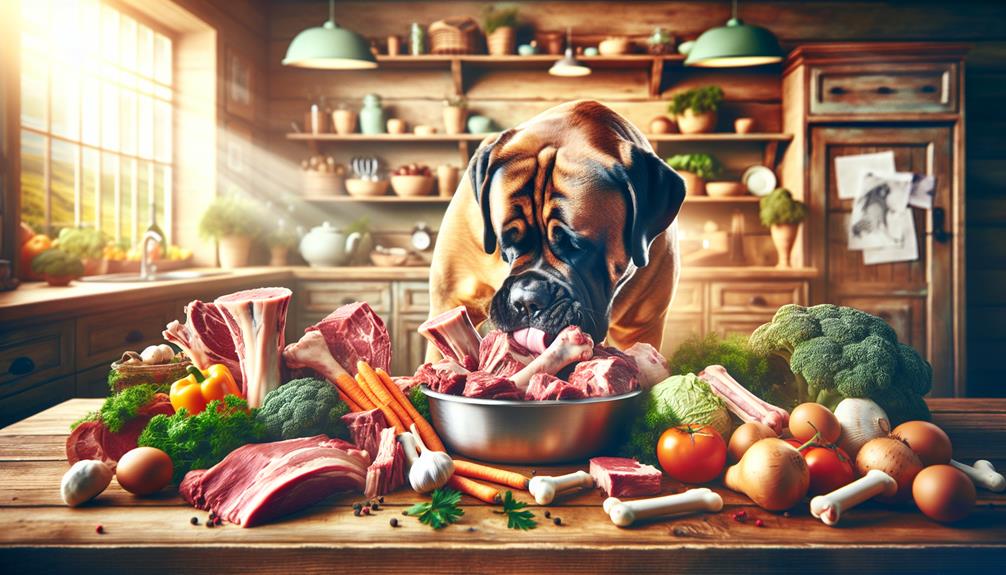Determining the ideal raw diet for a Mastiff involves a thorough understanding of their unique nutritional requirements. This breed, known for its massive size and muscular build, necessitates a diet rich in high-quality proteins, balanced with essential vitamins and minerals. Key components such as raw meaty bones, organ meats, and fatty acids play pivotal roles in supporting their skeletal health and immune function. However, the complexities of achieving the perfect balance between these elements cannot be overstated. What specific considerations should be made to guarantee a Mastiff’s diet is both nutritionally complete and safe? Curious about crafting the perfect raw diet for your Mastiff dog? Discover the key essentials to ensure optimal health and vitality.
Key Takeaways
- Include high-quality protein sources like beef, chicken, lamb, and fish for muscle mass maintenance.
- Provide raw meaty bones to supply calcium, phosphorus, and support dental health.
- Incorporate essential fatty acids from fish oil and flaxseed for joint health and coat condition.
- Ensure the diet includes organ meats, such as liver and kidney, for essential vitamins and minerals.
- Maintain a calcium to phosphorus ratio of 1.2:1 and supplement with Vitamin D for optimal bone health.
Understanding Mastiff Nutritional Needs

Understanding the specific nutritional needs of Mastiffs is essential for devising a balanced and health-promoting raw diet. Mastiffs, being a giant breed, require a diet tailored to their unique physiology, including substantial muscle mass and potential joint issues. Adequate protein sources are paramount, as they support muscle growth, repair, and overall vitality. High-quality proteins such as beef, chicken, and fish should be prioritized to meet their dietary requirements effectively.
Moreover, the meal frequency for Mastiffs plays an important role in their overall well-being. Due to their predisposition to bloat (gastric dilatation-volvulus), it is advisable to divide their daily food intake into multiple smaller meals rather than one or two large meals. This approach not only aids in better digestion but also helps in maintaining steady energy levels and prevents rapid overeating.
Scientific evidence suggests that a well-balanced raw diet for Mastiffs should be rich in essential amino acids, vitamins, and minerals while being mindful of maintaining an appropriate caloric intake. A meticulously planned diet ensures that these dogs receive a balanced nutritional profile, fostering their health, longevity, and freedom from diet-related ailments.
Key Components of a Raw Diet
A well-formulated raw diet for Mastiffs should encompass high-quality protein sources, essential fatty acids, and a variety of vitamins and minerals to support their extensive nutritional needs. Protein sources are fundamental for muscle development, tissue repair, and overall vitality. Ideal choices include muscle meat from beef, chicken, lamb, and fish, which provide complete amino acid profiles essential for large breeds like Mastiffs.
Bone content is another critical component, delivering necessary calcium and phosphorus for bone health and dental hygiene. Raw meaty bones such as chicken necks, wings, and beef ribs are excellent, ensuring proper nutrient absorption and mechanical cleaning of teeth. However, care must be taken to avoid excessively large or hard bones that could pose choking hazards or cause dental fractures.
Essential fatty acids, particularly Omega-3 and Omega-6, contribute to skin health, coat condition, and anti-inflammatory processes. Sources such as fish oil, flaxseed, and poultry fats are recommended.
The inclusion of organ meats like liver and kidney is also essential, as they offer a concentrated source of vitamins A and B, iron, and other trace minerals.
Through careful selection of these key components, a raw diet can be tailored to meet the unique dietary demands of Mastiffs.
Balancing Vitamins and Minerals
Balancing vitamins and minerals in a Mastiff’s raw diet is vital to prevent deficiencies and promote peak physiological function. Proper vitamin absorption and mineral balance are essential for maintaining overall health, particularly in large breeds like Mastiffs, which are prone to certain nutritional disorders.
The following guidelines guarantee a well-balanced diet:
- Calcium and Phosphorus Ratio: Maintaining a calcium to phosphorus ratio of approximately 1.2:1 is crucial for skeletal health. This balance is critical in preventing conditions such as hip dysplasia and osteoarthritis.
- Vitamin D Supplementation: Vitamin D aids in calcium absorption, ensuring proper bone mineralization. Insufficient levels can lead to rickets or osteomalacia. Sources include fatty fish, liver, and egg yolks, but careful supplementation is often necessary.
- Trace Minerals: Elements such as zinc, copper, and selenium are indispensable for immune function, skin health, and antioxidant defense. Organ meats and seafood can provide these trace minerals, but precise quantities must be monitored to avoid toxicity.
- B-Vitamins: These water-soluble vitamins are vital for metabolic processes, neurological function, and red blood cell formation. Liver, lean meats, and eggs are excellent sources, ensuring thorough coverage of B-complex vitamins.
Adhering to these principles ensures that a Mastiff’s raw diet is both nutritionally complete and biologically appropriate.
Benefits and Risks of Raw Feeding
Raw feeding for Mastiffs offers numerous benefits such as enhanced coat condition, improved dental health, and increased energy levels, but it also presents significant risks including bacterial contamination and nutritional imbalances. Advocates of raw diets often cite improved gastrointestinal health and more appropriate body weight as additional advantages.
Raw feeding can also provide psychological benefits, such as satisfying a dog’s natural chewing instincts, which can be particularly beneficial for large breeds like Mastiffs.
However, the risks associated with raw diets cannot be overlooked. Bacterial contamination from pathogens such as Salmonella and E. coli is a significant concern, posing health risks to both the animal and the household. Nutritional imbalances, resulting from improperly balanced meals, can lead to deficiencies or toxicities. Hence, careful attention to feeding schedules and portion sizes is paramount to mitigate these risks.
Veterinary guidance is essential for optimizing the diet to ensure it meets the nutritional requirements specific to Mastiffs. Regular monitoring and adjustments to the feeding schedule and portion sizes can help maintain good health.
Ultimately, while a raw diet offers enticing benefits, it requires meticulous planning and ongoing oversight to avoid adverse outcomes.
Frequently Asked Questions
How Do I Transition My Mastiff to a Raw Diet?
Acclimating a Mastiff to a raw diet is akin to familiarizing a seasoned sailor to new waters. A gradual adjustment guarantees digestive adaptations, minimizing gastrointestinal disturbances, and promoting peak health. Start by incorporating small raw portions.
Can I Include Supplements in My Mastiff’s Raw Diet?
Including supplements in a Mastiff’s raw diet can provide significant benefits. Essential vitamins and minerals, such as calcium and omega-3 fatty acids, guarantee balanced nutrition and support overall health, enhancing the diet’s effectiveness and your pet’s well-being.
How Do I Store and Handle Raw Food Safely?
Ensuring safe thawing is paramount; think of it as a shield for your Mastiff’s health. Implement rigorous hygiene practices, including proper storage at below 40°F, and meticulous cleaning of surfaces and utensils, to mitigate contamination risks.
Are There Any Specific Raw Food Brands Recommended for Mastiffs?
For mastiffs, commercial options like Primal Pet Foods and Stella & Chewy’s are recommended, ensuring nutritional balance. These brands provide evidence-based formulations tailored to large breeds, supporting peak health and freedom from dietary deficiencies.
What Should I Do if My Mastiff Refuses to Eat Raw Food?
What if your mastiff refuses to eat raw food? Consider potential behavioral issues and seek veterinary advice to address underlying causes. A professional can provide evidence-based strategies to encourage dietary compliance and promote peak health.
Conclusion
In summation, the formulation of an ideal raw diet for Mastiffs necessitates meticulous attention to high-quality protein sources, essential fatty acids, and organ meats, ensuring skeletal robustness and immune resilience.
Moreover, a judicious balance of vitamins and minerals, particularly calcium and phosphorus, is crucial.
While raw feeding presents certain advantages, potential drawbacks must be meticulously managed.
Therefore, an evidence-based approach to dietary planning is indispensable in fostering the overall vitality and longevity of these majestic canines.



